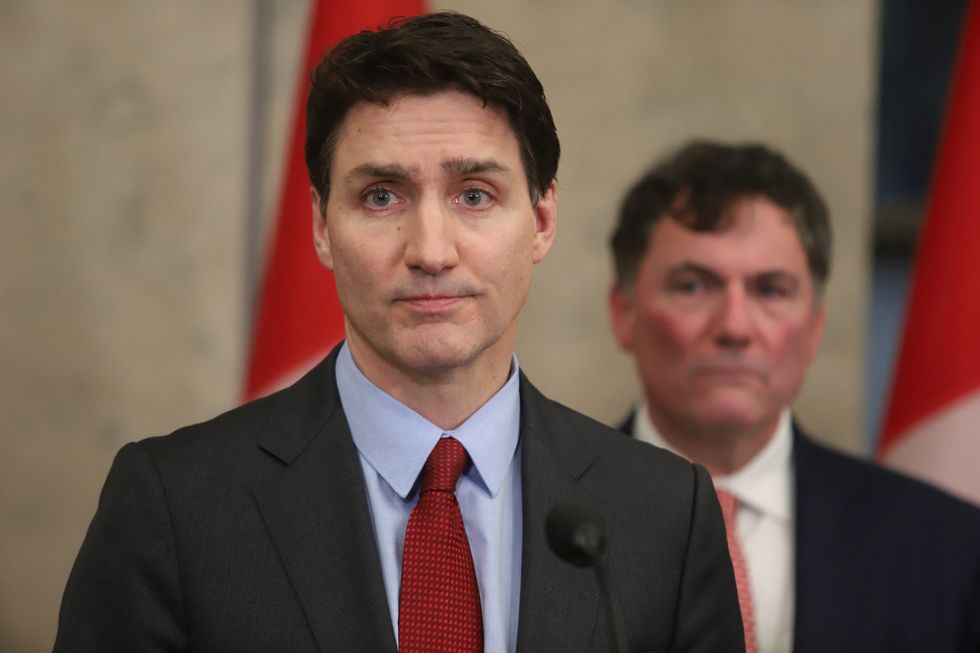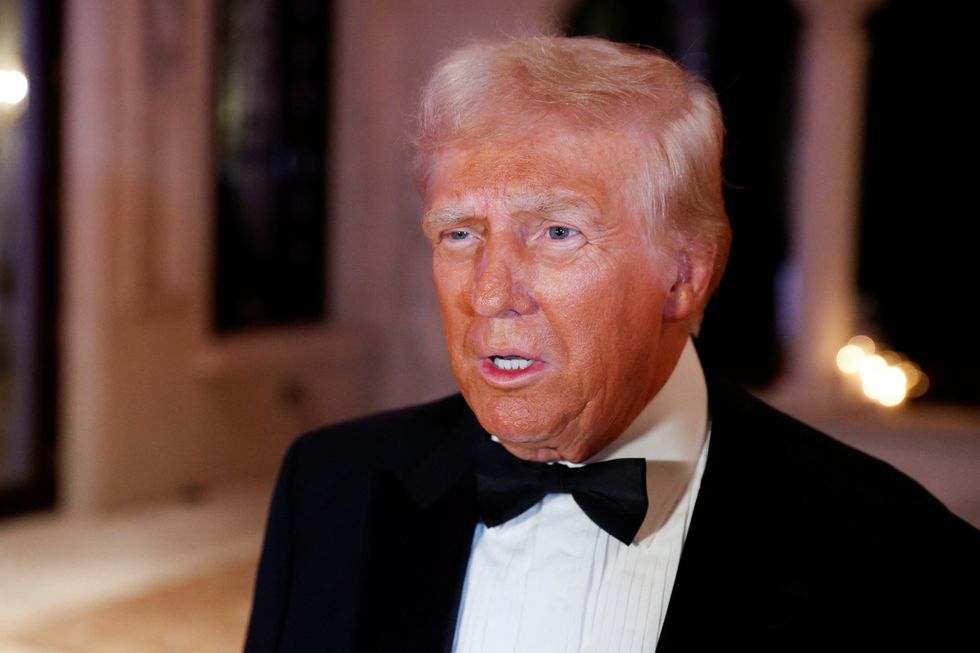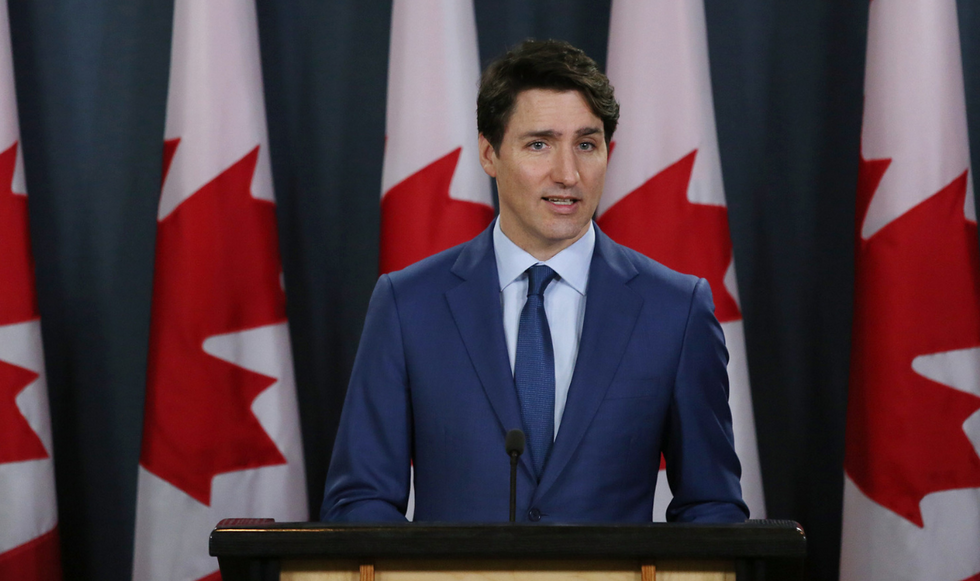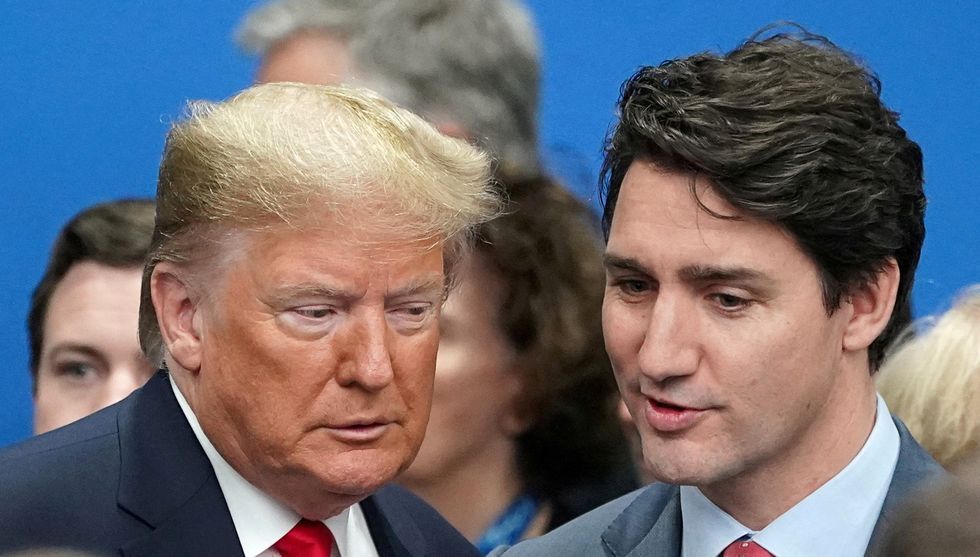‘You will lose jobs!’ Canada hits back against Trump’s tariffs as Trudeau demands ‘US boycott’
Outgoing Canadian Prime Minister Justin Trudeau has announced retaliatory tariffs of 25 percent on C$30 billion of US goods, with plans to potentially target an additional C$125 billion worth of American products following a public consultation period.
The move comes in direct response to US President Donald Trump’s executive order implementing 25 percent tariffs on Canadian imports.
Trudeau revealed the counter-measures during a late-evening address from Parliament Hill in Ottawa on Saturday, marking a significant escalation in trade tensions between the two North American allies.
The initial Canadian tariffs will take effect on Tuesday, while the additional measures could follow after a 21-day public comment period.

In his address, Trudeau spoke directly to Americans, warning US jobs would now be put at risk.
The outgoing Prime Minister said: “Tariffs against Canada will put your jobs at risk, potentially shutting down American auto assembly plants and other manufacturing facilities.
“They will raise costs for you, including food at the grocery store and gas at the pump.”
He also referenced shared sacrifices from “the beaches of Normandy at the end of the Second World War to the alleyways of Kandahar, Afghanistan”.
The Prime Minister particularly emphasised Canada’s support during the September 11, 2001 attacks, when the country provided refuge to stranded passengers and aircraft.
“We were always there, standing with you, grieving with you,” Trudeau said, adding that together the two nations had built “the most successful economic, military and security partnership the world has ever seen.”
The initial wave of Canadian tariffs will target a broad range of American consumer goods and materials.
Ex-Bank of England Governor Mark Carney, who is seen as the frontrunner to replace Trudeau, echoed the Prime Minister’s calls.
He described President Trump as a “bully” and vowed retaliatory action.
The trade war also comes after Trump appeared to jokingly push for Canada to become the 51st US state.
Trudeau’s measures will affect wine and bourbon, fruits and fruit juices including orange juice, as well as vegetables.
Personal care items like perfume will face tariffs, alongside clothing and shoes.
Major household items including appliances, furniture and sports equipment will also be impacted.
LATEST DEVELOPMENTS:
- Labour warns Trump tariffs could have ‘really damaging impact’ on global economy
- Trump green-lights mass tariff rollout against China, Mexico and Canada in TRIPLE executive order
- ‘Tariffs all the way!’ Trump vows ‘very substantial’ trade war against ‘terrible’ EU

The tariffs will extend to industrial materials such as lumber and plastics, with Trudeau emphasising there would be “much, much more” to come.
After a 21-day consultation period, Ottawa plans to expand the tariffs to include passenger vehicles, electric vehicles, steel products, aerospace goods, and various meat and dairy products.
In a direct appeal to Canadian consumers, Trudeau urged them to take personal action through their purchasing choices.
The Prime Minister encouraged Canadians to check labels at supermarkets and opt for domestic products.
He specifically suggested choosing “Canadian rye over Kentucky bourbon” and “foregoing Florida orange juice altogether”.
Trudeau also called on Canadians to reconsider their holiday plans, suggesting they “stay here in Canada” rather than travelling to the United States.
The call for a grassroots boycott represents an unprecedented step in encouraging Canadians to actively participate in the trade dispute through their daily consumer choices.
Economic experts have warned of severe consequences for both nations, with the auto industry particularly vulnerable.
Flavio Volpe, president of Canada’s Automotive Parts Manufacturers Association, predicted the industry would “shut down in the US and Canada and Mexico within a week”.
The Canadian Labour Congress estimates 2.4 million jobs across Canada are at risk.

Bank of Canada Governor Tiff Macklem acknowledged the policy will test Canada’s economy.
The Canadian Chamber of Commerce president, Candace Laing, stated American households and businesses would inevitably face increased costs.
“He promised to bring costs down. No one can seem to make the MAGA math work on all of this,” Laing told POLITICO.
Provincial leaders across Canada have voiced strong opposition to the US tariffs.
Ontario Premier Doug Ford warned that “hundreds of thousands of jobs” in his province are at risk.
“Companies orders are going to slow down. Factories will have to reduce shifts,” Ford said during a campaign stop near Toronto.
Ford has called a snap election for 27 February, arguing he needs a stronger mandate to confront the US president.
Alberta Premier Danielle Smith, who had previously travelled to Mar-a-Lago seeking energy exemptions, called the policy “mutually destructive”.
Smith predicted the measures would strain the Canada-US alliance.
US Democratic lawmakers have voiced strong opposition to the tariffs, with 42 House Democrats signing a letter warning of harm to diplomatic ties.

Rep Greg Stanton of Arizona cautioned that “the real pain will be felt by everyday Americans”.
Senator Adam Schiff shared on X that “Trump’s tariffs will be paid by Americans. Like a tax.”
Canadian Conservative leader Pierre Poilievre condemned the tariffs as “massive, unjust and unjustified.”
Poilievre emphasised the close relationship between the nations, noting that “Canada is the United States closest neighbour, greatest ally and best friend.”
Michigan Governor Gretchen Whitmer expressed concern about the impact on border state residents.
Trudeau firmly rejected US claims about fentanyl and illegal migrants entering from Canada.
The Prime Minister acknowledged Canada could enhance border security, pointing to a C$1.3 billion package recently presented in Washington by Cabinet ministers.
Ontario Premier Ford emphasised the distinction with Mexico on the fentanyl issue, telling CNN: “We’re responsible for .001 percent compared to Mexico. We are no Mexico.”
The White House indicated tariffs would remain until the fentanyl crisis is “alleviated.”
“We don’t want to be here,” Trudeau declared. “We didn’t ask for this, but we will not back down.”
Ford characterised the situation as “not a one-day battle” but rather “a four-year battle against President Trump.”

